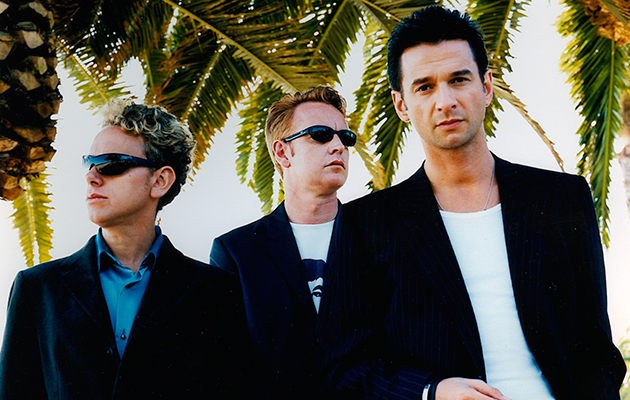“People who romanticise the booze and drugs lifestyle should try living it,” says Martin Gore. Here, Basildon’s kings of electro-sleaze seem reinvigorated as they discuss 30 years of highs, lows and landmark LPs, and look forward to the release of a new one. “It’s a good time to be in this...
SONGS OF FAITH AND DEVOTION
MUTE, 1993
Dirty electro-grunge, recorded in rather fractious circumstances. The notoriously excessive tour that followed almost killed the band…
GAHAN: We took a couple of years after Violator, the longest we’d had without seeing each other at that point. I moved to LA, hung around on the Sunset Strip scene with all the bands coming up at that time, like Jane’s Addiction. It was exciting, but the excess, the drinking and the drugs, became priority. I came back all gung-ho about this new-found rockism, but the others weren’t playing ball. Ha ha!
FLETCHER: Dave actually locked himself away for days on end, painting. Alan was really not in a good mood, he was just eating apples, not communicating with anyone else.
GAHAN: It sounds ridiculous, but I didn’t see at the time how my behaviour was affecting everything. [Producer] Flood still describes Songs Of Faith And Devotion as the darkest LP he’s ever made – and this was after Smashing Pumpkins, Nick Cave, Nine Inch Nails. I remember being in the kitchen with him in a house in Madrid, and he was in tears.
GORE: None of us were communicating, we were all on totally different wavelengths. We were still going out every night, to clubs in Madrid. That was our main aim. But it still turned out a good record.
FLETCHER: We’d had massive success with Violator, a very digital masterpiece, but Songs… was completely different. I still think it was brave, and the right decision. It still sounds really great. That album probably gets more attention than any other. It was our first No 1 debut in America and England at the same time.
GAHAN: It’s OK if you all go out and have a drink and a little sniff together. But if you’re all doing different chemicals, it doesn’t work when you’re making music.
FLETCHER: The LP itself is really good… what was bad was the huge tour afterwards. The whole period was a bit of a horror. I had a breakdown before the tour so it was tough for me. At the end, I finally said I can’t do it and left. I lucked out there, as I missed the notorious Primal Scream shows. I was in the Priory during that time, along with Laurence Tolhurst from The Cure. He was in the alcoholics section, I was in the mad section. I thought I had a brain tumour. I’d probably been doing too many drugs in Madrid, drinking too much, and it was a delayed reaction to that. A huge strain.
________________________
EXCITER
MUTE, 2001
Confident, eclectic comeback following the shaky Ultra, which still bore the scars of Gahan’s junkie period. Producer Mark Bell is perhaps best-known as one half of LFO, and for his work with Björk.
GAHAN: I call that the Mark Bell album. To me that was the record that said: yeah, we’re still
around and there’s more to come. What was great about Exciter was that we made it at all, because after Ultra [1997] I wasn’t sure we would make another record. It was fear of jumping into that thing again, going on the road, all that stuff. I was too raw.
GORE: Dave had been clean for four or five years when we started recording Exciter. It was really different again. Mark Bell didn’t come in with a team, he was really hands-on. It’s not my favourite album overall, but there are some of my favourite songs on there, like “When The Body Speaks” and “The Sweetest Condition”.
FLETCHER: Ultra had been a big success for us, but that was probably the nearest Depeche ever got to splitting up. We all went through horrendous problems, but I would say that the mood within the group has been getting better and better since Exciter. I’d like to think that it’s peaking at the moment. It’s a good time to be in Depeche Mode.
________________________
SOUNDS OF THE UNIVERSE
MUTE, 2009
Bursting with big tunes and black humour, the band’s latest reflects a blazing confidence. Significant factors include Gore giving up booze, and Gahan’s recent graduation to co-songwriting duties.
GORE: There’s more of a mutual respect between us. I gave up drinking, which helped. Dave probably felt more solidarity with me, I was not so out on a limb.
GAHAN: Martin and I are in a similar place, a new adrenalised version of ourselves, with a better work ethic. This LP is like our Burn After Reading – dark but you’re still laughing.
GORE: Creative friction’s an urban myth. I fell into the trap of thinking I couldn’t be prolific unless I was drinking, or on some drug. But I’ve been far more prolific since I stopped. It’s the same with friction. This LP has been far easier to make than Songs…People who romanticise that lifestyle should try living it.
GAHAN: On Playing The Angel [2005], I was a bit more like: ‘I’m not even doing the record unless I get a few tracks on.’ But with this one, especially after my solo LP, Hourglass [2007], which Martin really liked, I think he felt I’ve paid my dues a bit. I’ve no problem being the sub. I was in the locker room for years, now I’m on the bench. At least I get to play for the last 10 minutes… if we’re ahead.
Uncut: the spiritual home of great rock music.



